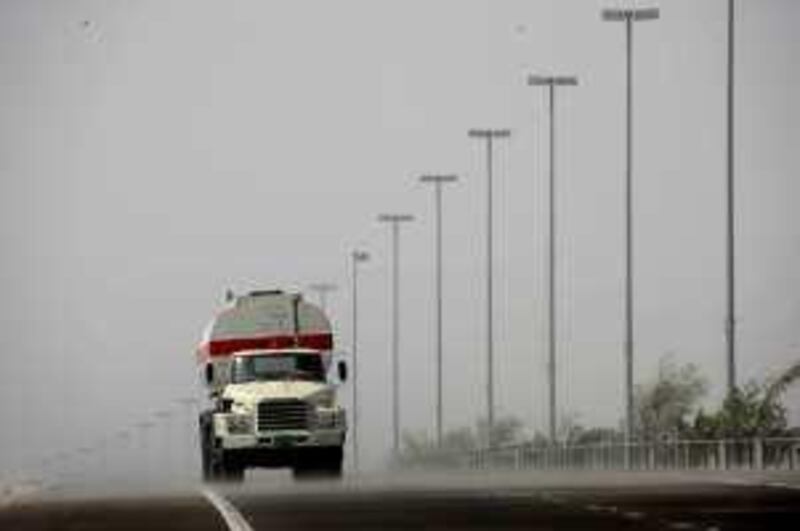ABU DHABI // A doctor has called for lorry drivers to face roadside tests for diabetes. Dr Sean Petherbridge, a specialist in family medicine at the Infinity Clinic in Dubai, said he would like to see a national roadside screening programme to test drivers' blood sugar levels. He said insulin-affected diabetics were at risk of falling into a coma if their blood sugar levels were not properly maintained.
"Too high blood sugar leads to drowsiness and dehydration leading to poor concentration," he said. "There is also a risk of coma when the diabetes is uncontrolled." Dr Petherbridge said the best medicines for managing blood sugar levels cost a large proportion of a driver's salary and that taking insulin was "not compatible with driving a heavy goods vehicle". According to the World Health Organisation (WHO) India has the largest population of diabetics, followed by China, the US and Indonesia. In 2000, India had 31.7 million diabetics, a figure expected to rise to 80 million by 2030.
Both type 1 and type 2 diabetes can be treated with insulin, which regulates the sugar in the bloodstream. Dr Petherbridge said there was a genetic component for Indians and Pakistanis, as there is with Emiratis, but "there are also dietary habits that are hard to break". One truck driver, Habib Shah, 57, suspected he had diabetes when he was unable to stop his hands and feet from shaking. He had heard of similar symptoms from his fellow drivers and booked a Dh20 blood test. The test confirmed diabetes, commonly referred to as "sugar" in his native Pakistan.
"I did not want to hear it because I always thought I was healthy, but I found out that I had sugar," he said. Mr Shah's doctor asked him to return weekly for monitoring. "My wild days are behind me now," he said. "I have to maintain a routine. I've started with cutting down on sugar in my tea and on eating sweets." Another driver, Gul Mohammed, 54, was diagnosed with diabetes shortly after he moved to the UAE in 1977. Doctors in Pakistan advised him to take one pill a day, which he has done for more than three decades. He gets his tablets from Pakistan, where they are cheaper.
Mr Mohammed does not go for regular check-ups, which he saw as unnecessary since he was taking his pills. "Here it will cost you Dh20 per visit even with the insurance card so it adds up and can get expensive. I just do it every time I go home." As well as its effects on general health, diabetes is particularly dangerous for lorry drivers, who are often on the roads for long stretches. "In Europe, a four-hour drive requires a mandatory 20-minute rest as measured by a tachometer," said Dr Petherbridge. "Vehicles here are older and may be in poor repair. There may also be time pressures, for example sewage lorry drivers."
If the blood sugar levels become too high, which can happen when not enough insulin has been taken, hyperglycaemia occurs. If left untreated it can eventually cause unconsciousness and even death. If blood sugar is too low because there is too much insulin, hypoglycaemia can occur. This can leave the sufferer feeling shaky, weak and hungry. It can be treated by eating or drinking something sugary. If it is not treated, however, it can cause drowsiness, confusion and a loss of consciousness.
Diet is also crucial. Sufferers are advised to eat a consistent diet of a variety of foods. Consistency matters because the body responds to increased calories and fat by increasing the blood sugar. Some of the larger companies in the UAE do make efforts to ensure their employees are fit to drive. The Emirates National Oil Company (Enoc) introduced mandatory pre-employment health checks for drivers more than two years ago, with repeat check-ups every two years.
Dr Mark Newson-Smith, the company's chief medical officer, said if a health condition was detected that could affect driving, more frequent checks would be carried out to make sure the illness was well controlled. He added that Enoc had a blanket policy of not allowing drivers with diabetes behind the wheel. It was introduced "because of the understanding of the potential impact of ill health on the fitness to drive and safe operation of these vehicles," he said, "and the consequences of an accident involving these large vehicles carrying hazardous loads."
Enoc's tests are based on standards set by the US department of transportation, which are tougher than those in the UK or Australia. Without a testing regime, drivers can be reluctant to disclose their diabetes for fear of losing their jobs. However, some firms still leave employees to judge their own health. Tom Thomasne truck driver, , general manager at ADSO, a freight and transport company, said it was not always possible for diabetic drivers to control their disease.
"Drivers do not have a routine timetable for taking their food," he said. "People who have diabetes, they have to have a routine timetable to their daily diet. This is not possible for the drivers." He said that while they did offer free health checks, it was up to the drivers to attend the sessions. He said a lot of the lorry drivers did not eat breakfast or take regular stops on the roads, so they could maximise their earnings. "Sometimes they are ready to work all the time," he said. "Even though they are working in the daytime they are willing to work in the evening because they will get double salary."
There is no law that prevents diabetics from driving lorries, and the condition is not included in the driving licence blood tests. A spokesman for the traffic police said officers did not look for signs of diabetes when they stopped drivers for violations. He added that there had been no cases in which a driver found unconscious after an accident was believed to have blacked out before the crash.
munderwood@thenational.ae





